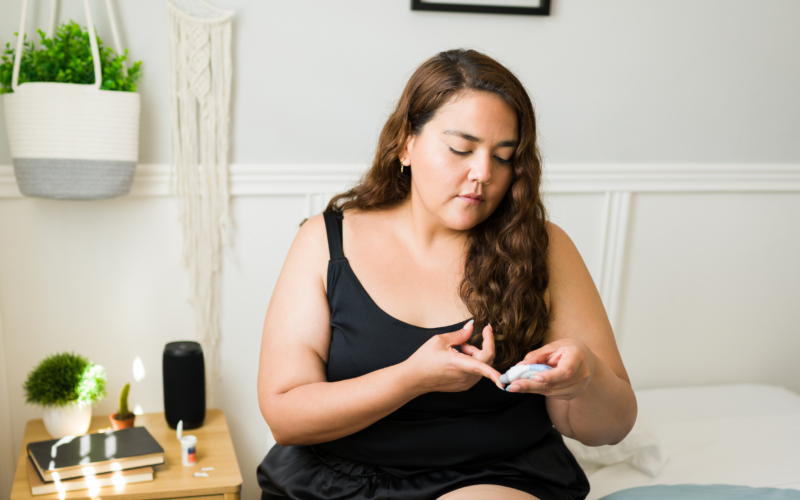If you know someone with Type 1 or Type 2 diabetes, you might also know it can cause certain complications, like kidney failure, eye problems, nerve problems (such as numbness and tingling in the hands and/or feet), and heart problems. But you might not think about the reproductive complications of diabetes, which can be particularly devastating for young women hoping to conceive. Can diabetes, whether Type 1 or Type 2, keep you from getting pregnant? And does good blood sugar control, also called good glycemic control, improve your chances of conceiving? Here’s what we know.
Does Type 1 diabetes make you infertile?
T1D leads to delayed menarche, puberty in girls
We know from research that girls who are diagnosed with Type 1 diabetes are more likely to get their first period (menarche) and develop breasts later than girls who don’t have diabetes [1][2]. Research done in the 1970s through early 2000s found that when a girl was diagnosed with Type 1 diabetes before menarche, she was more likely to experience irregular cycles, bleeding for longer than 7 days (menorrhagia), and other cycle problems later on compared to girls who didn’t have diabetes [1]. We know that around 33% of teen girls with Type 1 diabetes have irregular cycles (compared to around 16% of teens without diabetes), and this is regardless of how well-controlled their blood sugar is or isn’t [3].
Down the road, we know that women with T1D tend to have fewer pregnancies, higher rates of stillbirth, higher rates of hyperandrogenism (too many male hormones) and polycystic ovary syndrome (PCOS, characterized by hyperandrogenism plus other symptoms), and they tend to enter menopause earlier [3].
Why does diabetes impact fertility?
Why do girls with T1D start puberty and get their first periods later? Recall that Type 1 diabetics make too little or no insulin, the hormone that regulates your blood sugar. We may see reproductive impacts from Type 1 diabetes because insulin doesn’t just regulate blood sugar levels. Insulin also tells the hypothalamus in your brain to release Gonadotropin releasing hormone (GnRh), which signals other hormones to start puberty. Too little insulin and leptin (the hormone that helps you feel full after eating, which is also more likely to be low in teens with T1D) could translate to not enough GnRh production to kickstart puberty and support ongoing sexual maturation.
Why does T1D continue to impact the reproductive system well beyond the teen years?
There’s plenty we don’t yet know about exactly how and why T1D continues to impact a woman’s fertility throughout her reproductive lifespan, particularly in women with diabetes complications. However, research increasingly shows the interconnection of and interdependence between estrogen and insulin. Too much or too little insulin impacts estrogen levels, and estrogen plays a key role in ovulation. Without ovulation, there can be no conception.
Some research also suggests a connection between Type 1 diabetes and autoimmune thyroid disorders like Hashimoto’s. This appears to be related to why some women with T1D experience early menopause [1].
Does good blood sugar control help your chances of conceiving?
The good news is that good blood sugar control might help you conceive, even with diabetes. This 2009 research study noted that good glycemic control may lead to fertility rates more comparable to women who do not have diabetes. Even with roughly three decades of vastly improved blood sugar control for teen girls with T1D (thanks to improved insulin dosing and administration), rates of hyperandrogenism and PCOS are on the rise in this same group. This matters because hyperandrogenism and PCOS are both risk factors for infertility. Research suggests that upwards of 70% of women who experience anovulatory infertility (meaning that they’re infertile because they don’t ovulate) have PCOS [4].
Why the high rates of hyperandrogenism and PCOS amongst girls with T1D? The way insulin is delivered to diabetic girls and women may be causing this. Because insulin injections are absorbed directly into the bloodstream (rather than being buffered by the liver, as insulin normally is in people who don’t have diabetes), it may expose the ovaries of women with T1D to a super-concentrated form. As noted in a FACTS about Fertility explainer on diabetes and female fertility, “This bypassing of the liver seen with insulin injections may expose the ovaries to higher-than-normal levels of insulin and lead to overproduction of sex hormones.” Hence, perhaps, hyperandrogenism and PCOS.
An analogy to help explain how tight blood sugar control might lead to hyperandrogenism and PCOS
A similar example of the way our bodies can respond in unexpected ways to synthetic hormones (even if they are chemically the same as the ones produced by our bodies) is the difference between Pitocin given to induce labor, compared to oxytocin produced naturally by the body when a woman is in labor. We already know that the body doesn’t respond to Pitocin the same way that it does to naturally produced oxytocin, even though chemically, they’re exactly the same. The difference in effects seems to be because Pitocin is administered continuously and doesn’t cross the blood-brain barrier, whereas oxytocin is released in tiny pulses and does cross the barrier. Similarly, even though injected insulin is chemically the same as naturally produced insulin, it isn’t necessarily processed by nor affect the body in the same way.
Can Type 2 diabetes cause infertility?
Research suggests that women with Type 2 diabetes are more likely to experience infertility than women who are not diabetic [5]. And if they conceive, these same women are more likely to suffer miscarriage or stillbirth. According to this 2021 study, “women with type 2 diabetes had approximately 25% lower chance of childbirth compared with women without any type of diabetes,” regardless of whether or not they also had obesity or PCOS [5]. This is not to say that obesity and PCOS don’t increase the risk of infertility, because they certainly do. It just means that obesity isn’t the only reason women with Type 2 diabetes may struggle to get pregnant.
Infertility in women with Type 2 diabetes may be related to some combination of late menarche (first period), premature menopause, lower ovarian reserve (meaning fewer eggs and/or poor-quality cervical mucus), ovulation problems due to ongoing hormonal imbalances, and sexual dysfunction [1][5]. Notably, “Sexual dysfunction” (which encompasses a host of issues, ranging from decreased libido or arousal or ability to orgasm to pain during sex) is also estimated to affect 68% of women with Type 2 diabetes [6].
The bottom line on whether diabetes can make you infertile
The answer to whether diabetes can make you infertile is: it depends. It depends on how well-controlled your blood sugar is, and whether you also have obesity and/or PCOS. How old you were when you were diagnosed with diabetes matters, too. Fortunately, thanks to improved blood sugar control (and thus, fewer diabetic complications) women with Type 1 diabetes are far less likely to experience infertility than their foremothers. Developing diabetes complications certainly leads to decreased fertility regardless of whether you have Type 1 or Type 2, so preventing complications by living a healthy lifestyle and managing your blood sugar is key.
As we’ve covered before, women with Type 1 and Type 2 diabetes have much to gain from charting their cycles with an evidence-based fertility awareness method (FAM), and from seeking care from a provider trained in restorative reproductive medicine. Charting can be especially helpful for teen girls with Type 1 diabetes as they seek to manage their blood sugar during the different phases of their cycles. For either type of diabetes, cycle charting patterns suggestive of ovulation problems can be identified and addressed proactively and early on, rather than after months or years of struggling to conceive.
References:
[1] Livshits A, Seidman DS. Fertility Issues in Women with Diabetes. Women’s Health. 2009;5(6):701-707. doi:10.2217/WHE.09.47 [2] Thong EP, Codner E, Laven JSE, Teede H. Diabetes: a metabolic and reproductive disorder in women. Lancet Diabetes Endocrinol. 2020;8(2):134-149. doi:10.1016/S2213-8587(19)30345-6. [3] Schweiger, B.M., Snell-Bergeon, J.K., Roman, R. et al. Menarche delay and menstrual irregularities persist in adolescents with type 1 diabetes. Reprod Biol Endocrinol 9, 61 (2011). https://doi.org/10.1186/1477-7827-9-61 [4] Sawant S, Bhide P. Fertility Treatment Options for Women With Polycystic Ovary Syndrome. Clin Med Insights Reprod Health. 2019 Dec 27;13:1179558119890867. doi: 10.1177/1179558119890867. PMID: 31908561; PMCID: PMC6935873. [5] Rahmanian, E., Salari, N., Mohammadi, M. et al. Evaluation of sexual dysfunction and female sexual dysfunction indicators in women with type 2 diabetes: a systematic review and meta-analysis. Diabetol Metab Syndr 11, 73 (2019). https://doi.org/10.1186/s13098-019-0469-z [6] Mattsson, Kristina et al. “Fertility outcomes in women with pre-existing type 2 diabetes-a prospective cohort study.” Fertility and sterility vol. 116,2 (2021): 505-513. doi:10.1016/j.fertnstert.2021.02.009Additional Reading:
Does birth control affect blood sugar?
Should your daughter with Type 1 diabetes go on birth control?











